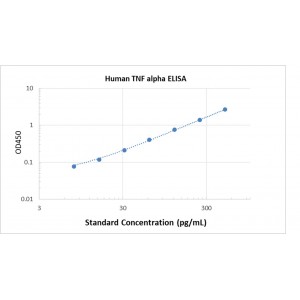Cart
0
Product
Products
(empty)
No products
To be determined
Shipping
$0.00
Total
Product successfully added to your shopping cart
Quantity
Total
There are 0 items in your cart.
There is 1 item in your cart.
Total products
Total shipping
To be determined
Total
Data sheet
| Background | Tumor necrosis factor-alpha(TNF-alpha, or TNF) is secreted by macrophages in response to inflammation, infection and cancer. Human Tumor Necrosis Factor(TNF) and Lymphotoxin(TNF-beta) are cytotoxic proteins which have similar biological activities and share 30% amino acid homology. TNF-alpha is produced by monocytes, which can stimulate endothelial cells to produce the multilineage growth factor granulocyte-macrophage colony-stimulating factor and extend the role of this immunoregulatory protein to the regulation of hematopoiesis in vitro. TNF is a soluble protein that causes damage to tumor cells but has no effect on normal cells. Human TNF has been purified to apparent homogeneity as a 17.3-kilodalton protein from HL-60 leukemia cells and has showed cytotoxic and cytostatic activities against various human tumor cell lines. The human TNF cDNA is 1585 base pairs in length and encodes a protein of 233 amino acids. The mature protein begins at residue 77, leaving a long leader sequence of 76 amino acids. TNF-alpha has been mapped to human chromosome 6. Cytokine that binds to TNFRSF1A/TNFR1 and TNFRSF1B/TNFBR. It is mainly secreted by macrophages and can induce cell death of certain tumor cell lines. It is potent pyrogen causing fever by direct action or by stimulation of interleukin-1 secretion and is implicated in the induction of cachexia, Under certain conditions it can stimulate cell proliferation and induce cell differentiation. Impairs regulatory T-cells (Treg) function in individuals with rheumatoid arthritis via FOXP3 dephosphorylation. Upregulates the expression of protein phosphatase 1 (PP1), which dephosphorylates the key 'Ser-418' residue of FOXP3, thereby inactivating FOXP3 and rendering Treg cells functionally defective (PubMed:23396208). Key mediator of cell death in the anticancer action of BCG-stimulated neutrophils in combination with DIABLO/SMAC mimetic in the RT4v6 bladder cancer cell line (PubMed:22517918). |
| Alternate Names | APC1 protein; Cachectin; Cachetin; DIF; TNF; TNF, monocyte-derived; TNFA; TNF-A; TNFalpha; TNF-alpha; TNF-alphacachectin; TNFATNF, macrophage-derived; TNFG1F; TNFSF1A; TNFSF2; TNFSF2TNF superfamily, member 2; tumor necrosis factor (TNF superfamily, member 2); tumor necrosis factor alpha; Tumor necrosis factor ligand superfamily member 2; tumor necrosis factor; tumor necrosis factor-alpha |
| Assay Type | Sandwich ELISA |
| Kit Type | ELISA Kit (Colorimetric) |
| Assay Time | 4.5 hours |
| Sample Type | Cell Culture Supernates, Serum, Plasma) |
| Assay Range | 7.8 - 500 pg/mL |
| Sensitivity | 5.1 pg/mL |
| Specificity | No significant cross-reactivity or interference between Human TNF alpha and analogues was observed. |
| Recovery | 95 - 108% |
| Precision | Intra Assay, 5.8%; Inter-Assay, 9.8%. |
| Sample Volume | 100 uL |
| Dilution Factors | Varies. Need to test before a large-scale assay. |
| Gene ID | 7124 |
| Citation | Storage of components varies. See protocol for specific instructions. |
| UniProt ID | P01375 |
More info
Kit Components
1. Lyophilized recombinant human TNF alpha standard: 1 ng/tube-2.
2. One 96-well plate precoated with anti- human TNF alpha antibody.
3. Sample diluent buffer: 12 ml x 2
4. Biotinylated anti-human TNF alpha antibody:180 µL, dilution 1:60.
5. Antibody diluent buffer: 12ml.
6. Straptavidin-HRP : 300µL, dilution 1:40.
7. Detection Ab diluent buffer: 12ml.
8. TMB color developing agent: 10ml.
9. TMB stop solution: 10ml.



